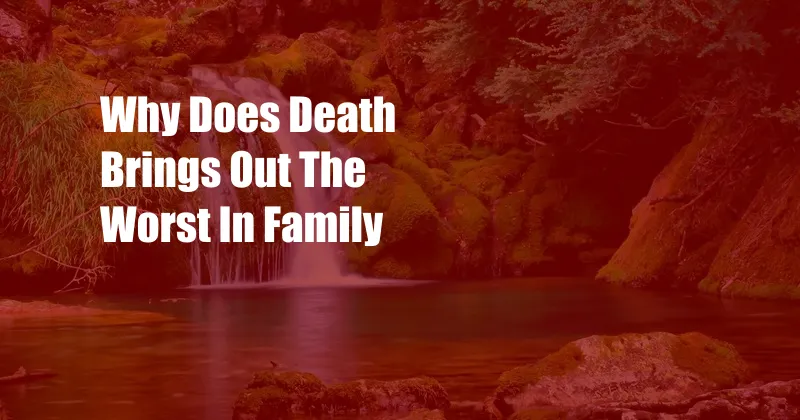
Why Does Death Bring Out the Worst in Family?
Death can bring out the best in family, but it can also bring out the worst. When someone dies, it’s not uncommon for family members to start fighting over money, property, and other possessions. They may also start to argue about who was closest to the deceased or who should have been responsible for their care. Sometimes, these arguments can even lead to physical violence.
There are a number of reasons why death can bring out the worst in family. One reason is that death can be a very stressful event. When someone dies, family members are often overwhelmed with grief, anger, and other emotions. This can make it difficult for them to think clearly and to make rational decisions.
The Effects of Death on Family Relationships
Grief and Loss
When someone dies, it’s normal for family members to experience grief and loss. This can lead to feelings of sadness, anger, guilt, and loneliness. Grief can also make it difficult for family members to communicate with each other and to resolve conflicts.
Unresolved Conflicts
Death can also bring up unresolved conflicts between family members. These conflicts may have been simmering for years, and the death of a loved one can bring them to the surface. unresolved conflicts can make it difficult for family members to move on from the death of their loved one.
Financial Issues
Death can also lead to financial problems for family members. The costs of funeral expenses, medical bills, and other expenses can be a burden for families. If the deceased had little or no life insurance, the family may be forced to sell their home or other assets to pay for these expenses.
Tips for Dealing with Death in a Family
Communicate Openly and Honestly
One of the best ways to deal with death in a family is to communicate openly and honestly with each other. This means talking about your feelings, both good and bad. It also means being willing to listen to what other family members have to say.
Be Respectful of Each Other’s Differences
It’s important to remember that everyone grieves differently. There is no right or wrong way to grieve. Be respectful of each other’s differences and allow everyone to grieve in their own way.
Seek Professional Help if Needed
If you’re struggling to cope with the death of a family member, don’t hesitate to seek professional help. A therapist can help you work through your grief and develop coping mechanisms.
Conclusion
Death is a difficult experience for everyone. But by following these tips, you can help to make it a little bit easier for your family.
Are you interested in learning more about death and grief? Visit our website for more information.
Frequently Asked Questions
Q: What is the best way to deal with the death of a loved one?
A: There is no one right way to deal with the death of a loved one. Everyone grieves differently. The best thing you can do is to be patient with yourself and allow yourself to grieve in your own way.
Q: How long does it take to grieve?
A: Grief is a process that takes time. There is no set timetable for how long it will take to grieve. Some people may grieve for months or even years. Others may grieve for a shorter period of time.
Q: What are some of the signs of grief?
A: Some of the signs of grief include sadness, anger, guilt, loneliness, and difficulty sleeping or concentrating.
Q: Is it normal to feel angry after the death of a loved one?
A: Yes, it is normal to feel angry after the death of a loved one. Anger is a common emotion that many people experience during the grieving process.
Q: How can I help a friend or family member who is grieving?
A: There are a number of ways you can help a friend or family member who is grieving. Some of the best things you can do are to listen to them, offer your support, and be patient.